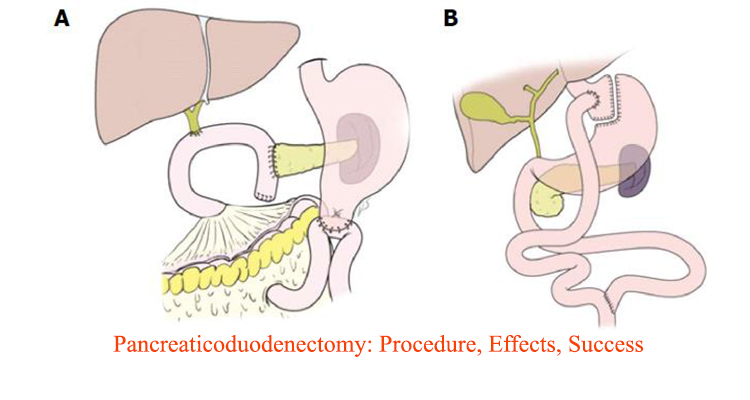Whipple Procedure Success Rate

Most types of cancer start showing symptoms in the early stages, making it easier for them to be diagnosed, but pancreatic cancer grows and spreads in the body without developing any early signs. On an estimated only 6% of patients are able to survive for more than five years after getting diagnosed with pancreatic cancer. The condition is more common in men than in women and can occur more often in diabetes patients.
For some patients, a surgical procedure called Pancreaticoduodenectomy might help in extending their life or it could also act as a potential cure.
Role of Pancreas
Pancreas is located in the lower abdomen, between the stomach and the intestine. It helps in digestion by producing the juices that digest food, and it also produces hormones like glucagon and insulin that help in maintaining blood sugar levels in the body. It is also responsible for storing and using the energy produced from the food.
Any dysfunction in the pancreas can cause the patient to experience dizziness and fatigue, making it hard for him to digest food or maintain a balance sugar level.
Pancreaticoduodenectomy
Pancreaticoduodenectomy aka Whipple Procedure is performed for treating tumors, and disorders related to the intestine, pancreas and bile duct. It is commonly used for the treatment of pancreatic cancer.
Whipple procedure has derived its name from a Columbian University Surgeon, MD, Allen Whipple, the first American who performed this surgery in 1935. The Whipple procedure is used for the removal of the wide part (head) of the pancreas that is present next to the duodenum (small intestine). The procedure can also be used for the removal of the gallbladder, bile duct, duodenum, or a portion of the stomach, depending on where the cancerous cells have travelled.
Whipple Procedure Success Rate
Whipple procedure is a very complicated surgery that has multiple risk factors. Patients who undergo this surgery have an approximately five-years of survival rate that might go up to 25%. It is hard to determine the Whipple procedure success rate, as the procedure can’t be conducted on every patient with pancreas cancer. Each cancer case is studied and treated with different approaches. Not all patients with pancreatic cancer are even eligible for the procedure. Only 20% of cases are diagnosed to be eligible for the procedure. These cases usually include patients whose cancerous tumor is confined to the head of their pancreas, and hasn’t spread in nearby organs like liver, lungs, blood vessels, or abdominal cavity. The potential candidates for Whipple procedure are identified based on a series of intensive testing. The patient need to admit in the hospital a week before the surgery, so that these tests can be performed on him/her and they can be prepared for the surgery.
Sometimes a patient can be eligible for laparoscopic (minimally invasive) Whipple procedure which is performed using several small incisions instead of using large incisions. Compared to Pancreaticoduodenectomy, laparoscopic results in less blood loss, fewer complications and quicker recovery.
Whipple Procedure is not considered suitable for over 40% of newly diagnosed patients, in which the tumor has spread beyond the pancreas. This procedure is rarely considered in curing advanced stages of the condition in which the disease has started spreading adversely.
Conditions that require a patient to get Whipple Surgery
- Pancreatic Cancer Treatment
- Benign Tumor Removal in Abdominal Regions
- Small Bowel Cancer
- Trauma in small intestine or pancreas
- Ampullary Cancer
- Bile Duct Cancer
- Pancreatitis
- Pancreatic Cryts
- Pancreatic Tumors
- Neuroendocrine Tumors
The goal of Whipple procedure is to remove the cancerous cells or tumor from the patient’s body, preventing it from growing or spreading in any other organ. This is the only treatment available for getting prolonged relieve from the above mentioned conditions.
Symptoms of Pancreas Cancer
Although the early signs of the pancreas cancer are extremely difficult to identify, the patient might experience the following condition as the infection progresses to spread in his/her body:
• Diabetes
• Fatty Tissue Abnormalities
• Nausea & Vomiting
• Liver Enlargement & Gallbladder
• Back or Belly Pain
• Jaundice or Related Symptoms
• Blood Clots
• Unexplained weight loss
• Drop in Appetite
FAQs
How much time is required to recover from Whipple Procedure?
The recovery of the patient after the procedure depends on the complexities faced during the operation. Some patients usually experiences fatigue and dizziness for two months after the surgery.
What is the success rate of the Whipple procedure?
In some cases, the pancreatic cancer patients might be cured, or his/her survival rate can be improved via Whipple procedure. However, only 6% patients were able to survive for 5 years after getting diagnosed with pancreas cancer.
What is the cost of Pancreaticoduodenectomy in India?
The average cost of Pancreaticoduodenectomy can start from USD 6500 depending on the case of the patient, and how adversely his/her tumor has spread in the nearby organs.
Explore Medmonks.com to learn more about Pancreaticoduodenectomy or book an appointment for the surgery with the best doctors in India.
Comments

By richards | 09.09.2018
Arthritis, a form of rheumatic disease, is characterized by inflammation and loss of function in some parts of the body.





